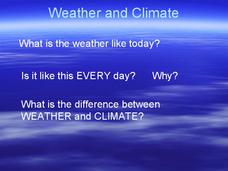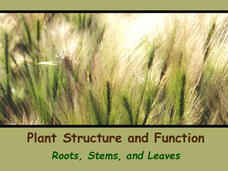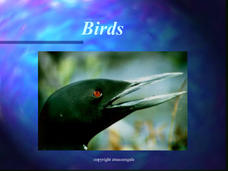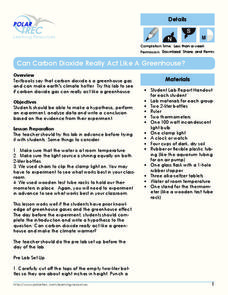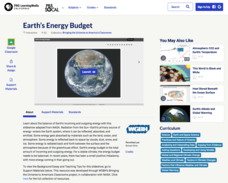Curated OER
Weather and Climate
It's hot today, but is that the weather or the climate? This colorful presentation isolates both concepts to allow for better understanding by covering the positioning of the planet, making comparisons of land versus water, and looking...
NOAA
Deep-Sea Benthos
Much like a distant planet, the underwater world of deep-sea benthos is strange and largely unknown. How do creatures survive and thrive in such extreme pressure and temperature conditions? Young oceanographers join the crew of Operation...
NOAA
Chemosynthesis and Hydrothermal Vent Life
What's life like in a hydrothermal vent? Find out in part five of a 13-part series. Learners journey to one of the harshest environments on the planet, the hydrothermal vent, to learn about the creatures that survive the extreme...
Biology Junction
Protists: The World of Protists
More than 200,000 species of protists exist, living on land and in water around the planet. Scholars view the diversity of protists in an interesting presentation. It divides protists into three groups: animal-like protists, plant-like...
Biology Junction
Plant Structure and Function: Roots, Stems, and Leaves
Scientists found fossils of plants more than 420 million years old—but plants existed for up to 100 million years prior to these fossils. Learn about the importance of plants to the entire planet. Viewing a presentation helps scholars...
Biology Junction
Birds
Birds adapted to almost every climate on the planet, from the Arctic to the rain forests. A presentation focused on birds covers their similarities and differences. It starts with their evolution from reptiles, their many physical...
School Science
The Big Bang Time Machine
Scholars take off on an interactive spaceship to explore a historical timeline of the big bang theory. They learn about the evolution of mammals and humans, the formation of stars and planets, and the chemical composition of the early...
Curated OER
Skulls Tell It All
Skulls tell it all, and with this lesson plan, you will tell it all to your class! Youngsters view animal skulls, analyzing the shape of teeth and the placement of the eye sockets. They associate these adaptations with the types of food...
Southwest Florida Water Management District
WaterWeb - Conservation and Water Supply
If 71% of our planet is covered with water, why do we need to bother conserving water? Find out with these activities designed for middle and high school environmental scientists. From reading articles to solving crossword puzzles, to...
NASA
Geographical Influences
"If global warming is real, why is it so cold?" Distinguishing the difference between weather and climate is important when it comes to understanding our planet. In these activities, young scientists look at the climate patterns in a...
NASA
Rover Races
Operating a vehicle remotely can be difficult, especially when the vehicle is on another planet. Young engineers get a feel for some of the real-world challenges as they work to program their rovers (blindfolded group members)...
Polar Trec
Can Carbon Dioxide Act Like a Greenhouse Gas?
Ninety-seven percent of scientists who study climate agree that human activity is warming the planet. Learners explore carbon dioxide as a greenhouse gas, a gas causing this warming, through a hands-on experiment. Once complete, they...
Research Parent
Universe Cards
A 9-page packet comes with 24 cards that have pictures and informational text about each object in the universe. From nebulae to dwarf planets, objects we see—or don't see—are represented in the cards through pictures and words.
Curriculum Corner
Earth Day Book
This Earth Day, celebrate our beautiful planet with an activity book that challenges scholars to show off their map skills, complete a crossword puzzle, write acrostic poems, alphabetize, and reflect on their personal Earth-friendly habits.
Freeology
Earth Day Word Search
Save the planet one vocabulary activity at a time! Offer scholars a chance to locate 20 words with an Earth Day-themed word search.
Super Teacher Worksheets
Make an Earth Day Mascot
Scholars follow three steps—color, cut, and fasten—to create a mascot for Earth Day. The holiday's mascot is a jolly planet Earth equipped with a big smile, excited eyes, and dancing arms and legs.
K20 LEARN
Shanking A Shark: Shark Dissection
Sharks are so cool, they have their own week! Take young zoologists on a journey into one of the most amazing creatures on the planet. A lesson plan the from K20 Center engages them in a full dissection. After the lab, participants...
PBS
Earth’s Energy Budget
Is Earth's energy flow a little off balance? Explore our energy budget using a click-through interactive. Scholars discover the many factors that move solar energy around the planet and why the system is no longer in equilibrium.
PBS
Seasons on Earth and Mars
Winter, spring, summer, and fall—Earth experiences them all! But what about Mars? Scholars compare the planets in terms of distance, tilt, and rotation during a lesson from PBS's Space series. Great visual models of Earth and Mars, plus...
PBS
Rain Shadows
Satellite images from NASA help scholars focus on the similarities on the planet rather than the differences. The photos from the installment of a larger PBS series exploring weather and climate compare geological formations in the...
PBS
Insolation on Earth
In 2017, the world increased the capacity for using solar energy by a whopping 32 percent. Is solar energy the future for the planet? Approach this topic from the idea of how much solar energy reaches the surface of Earth. Individuals...
Harvard University
Cosmic Questions
Scholars learn the stories of the universe with a unit study on the cosmos. They model the universe, learn about the relationship with the electromagnetic spectrum, understand the big bang theory, and debate the existence of life on...
Las Cumbres Observatory
The Cosmic Distance Ladder: Parallax
Scientists don't have a ruler long enough to measure to the stars, so they rely on math. Scholars learn to calculate the distance from Earth to a star using the parallax method. They use angle measures from different perspectives to...
Curated OER
Meet the Neighbors: Planets Around Nearby Stars
Students explain why a transiting planet causes a periodic dimming in the light from its parent star. They determine the radius of a planet, and its orbital distance, by analyzing data and manipulating equations. Students compare the...
Other popular searches
- Elementary Science Planets
- First Grade Science Planets
- Science Planets Solar System
- Math Science Planets
